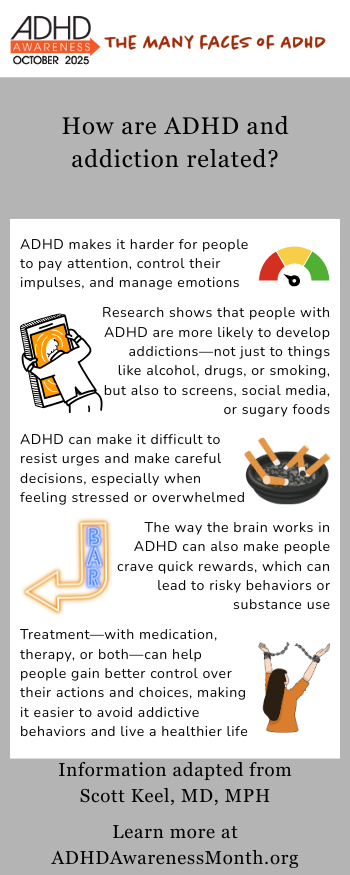People with ADHD are more likely to struggle with addiction because of challenges with impulsivity, self-control, and emotional ups and downs. Managing ADHD can help lower these risks and support healthier choices.

ADHD, or Attention-Deficit/Hyperactivity Disorder, is a condition that makes it harder for people to pay attention, control their impulses, and manage their emotions. Studies show that people with ADHD are more likely to develop addictions—not just to things like alcohol, drugs, or smoking, but also to screens, social media, or even sugary foods. This is because ADHD can make it tough to resist urges and make careful decisions, especially when feeling stressed or overwhelmed. The way the brain works in ADHD can also make people crave quick rewards, which can lead to risky behaviors or substance use.
These challenges often start in childhood and can continue into adulthood, so it’s important to spot and treat ADHD early. If ADHD isn’t managed, people might turn to substances or certain behaviors to feel better, but this can quickly turn into a habit that’s hard to break.
The good news is that treating ADHD—with medication, therapy, or both—can help people gain better control over their actions and choices. This makes it easier to avoid addictive behaviors and live a healthier life. Understanding this connection is a big step toward lowering the risk of addiction and supporting long-term well-being. Prevention is key. When we properly treat ADHD, we are able to help keep people’s confidence and self-esteem high, and in turn, lower the risk of addictions.
About the Author

Scott Keel MD MPH is a board certified physician practicing in Virginia, USA and medical director of Even Keel Health PLLC, an integrative and lifestyle medicine clinic that specializes in the diagnosis and management of ADHD in children and adults and the treatment and prevent of addiction, as well as other psychological, emotional, & behavioral health issues. He is also the medical director of the non-profit, Even Keel Health Partners.
Read more:
- Journal of Clinical Medicine: ADHD and Obesity: A Systematic Review and Meta-Analysis
- Frontiers in Psychiatry: The Relationship Between ADHD and Obesity
- Pediatric Research: ADHD is associated with disordered eating in adolescents
- Journal of the American Academy of Child and Adolescent Psychiatry: Systematic Review: How the ADHD Polygenic Risk Score Adds to Our Understanding of ADHD and Associated Traits
